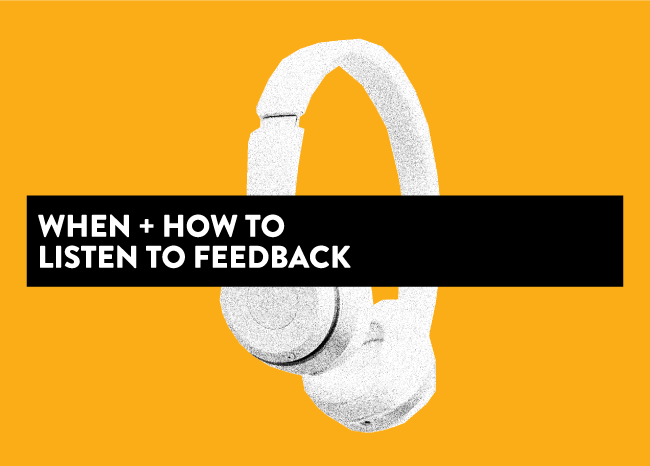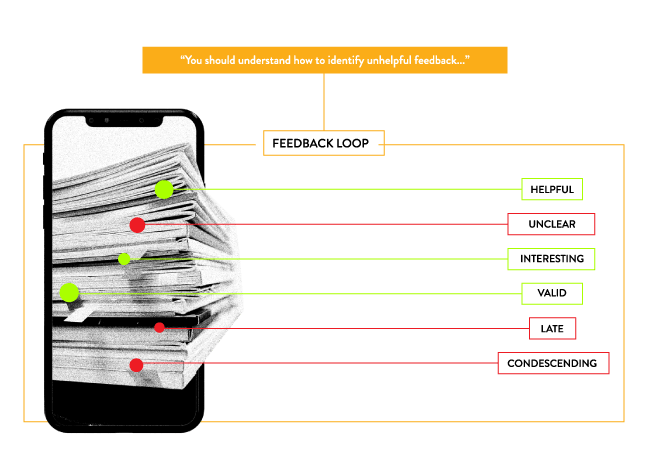
All professionals receive feedback as part of their career. Learning how to receive, apply, and grow from that critical feedback will have a dramatic impact on your professional growth.
As content marketers — particularly if you are the one creating the content – feedback is the life blood of quality content. High-quality content will require a substantial amount of editing and revision, on top of a deep understanding of target audiences for different pieces of content. Digital content development is becoming more widespread, and these services are in high demand even for small businesses.
Therefore, digital marketing professionals need to be aware of how to vet, critically understand, and sometimes respond to feedback. Not all feedback is useful, but it can also be difficult to accept valid feedback. As such, it is a challenge to identify useful feedback or its elements, and how to use that feedback to your advantage in revisions or future projects.
Constructive feedback can also be difficult to discuss with those that provided it, especially if you disagree with it in part, or don’t understand portions of it. In short, listening to and implementing feedback is a complex skill set that takes significant experience to develop.
Types of Feedback You Might Encounter
 In content marketing, you may receive feedback from your boss or manager, a professional editor, various clients and consumers, third-party arbiters of services, or many other invested parties. You may also receive this feedback through a variety of channels, such as professional communication mediums or online reviews.
In content marketing, you may receive feedback from your boss or manager, a professional editor, various clients and consumers, third-party arbiters of services, or many other invested parties. You may also receive this feedback through a variety of channels, such as professional communication mediums or online reviews.
Importantly, you can also pick up on critical feedback by monitoring message boards or even comment sections on videos and social media accounts relevant to your target audience. Learning what your audience cares about by listening to their engagement with one another, and feedback with major figures or platforms in the space, can be a powerful way to learn more about how you can better serve people with your own content.
Consumer feedback usually differs from professional feedback, in that the consumer is more focused on how they were personally affected. You should listen to consumer feedback because it can indicate how successful the product is in end-user satisfaction. Furthermore, by addressing consumer feedback you can improve the impact of things like your brand’s reputation and your rankings in local search. Positive outcomes in these areas can in turn result in further positive outcomes related to SEO goals, such as improving the Page Authority and Domain Authority of your target web addresses.
How To Meaningfully Listen to Feedback

One of the most difficult parts of listening to feedback is extracting the most relevant information or advice from the feedback. It also may require some insight to look past the direct advice and determine what the underlying issue or concern is.
Give Yourself an Emotional Buffer
Critical feedback on something you created can cause an emotional toll, especially if it is a project that took significant time and effort on your part. If this is the case for you, bear in mind that feedback is typically intended to help you — not criticize you directly.
This may be easy to understand conceptually, but often is difficult to truly believe and accept in the process of receiving critical feedback. Therefore, practice receiving feedback, as this is what will most help you learn to steel yourself against negative feelings stemming from criticism. To practice receiving feedback, be sure to:
- Listen to the feedback given without interruption.
- Recognize that it might be challenging for the individual to provide feedback.
- Avoid responding emotionally.
- Be openminded about the feedback.
- Understand the action steps that are given.
- Reflect on the feedback.
- Follow-up with the person giving the feedback.
There are also other steps you can take to protect yourself emotionally and avoid regrettable outbursts. To get ready to receive feedback, you can:
- Ask for feedback instead of waiting for it to be given.
- Ease your anxiety before a meeting by taking deep breaths or going on a walk.
- Remind yourself that feedback is not personal.
- Reflect on your skills and accomplishments as well as areas that need to be improved.
- Pause before responding.
- Remove any biases about the person giving feedback to stay open-minded.
You could also take a break to cool off before responding to feedback, or you may even benefit from talk therapy if you feel a lot of stress from an ongoing project or position.
Identify the Purpose or Substance of the Feedback
The first step you should take when reviewing feedback is to identify the major points and determine what the end goal of the feedback is meant to be. Often, a long rambling piece of feedback may be difficult to follow, parse out, and utilize.
However, it will be easier to constructively use feedback if you can identify what the major points are — are they asking for more detail, an authoritative source, and an adjustment of the target audience? Meanwhile, the end goal might be something simple like “we need this advice to be more actionable” or “we need this passage to be less confusing and more readable.”
Once you pick out and understand these factors, you can more effectively implement the lessons to create better content that serves your audience — something that all content marketing pieces should strive for.
Discuss With the Feedback Giver
To effectively implement the feedback, it is crucial to develop an action plan. By following up with the person providing the feedback, you can collaboratively ensure the progress of the project.
Discussion can be done over the phone, email, direct message, or a task platform — depending on the procedures followed in your workplace. This process may create tension as you both try to figure out the best course of action, however it’s important to approach every interaction witht the feedback giver calmly and politely.
You might indicate which part of the feedback is unclear to you, or you can explain why the feedback is difficult to implement or why you think another strategy may be more effective. Depending on the situation, you may also benefit from bringing in other professionals in your workplace to get their opinions.
An example of this may be feedback on a keyword-focused blog post that is discussing the maintenance of watersports equipment. An editor may provide feedback that you should include information about how to find a high-quality store for rental equipment. You may think this section would not align with searcher intent because the piece is focused on an audience of owners, rather than shoppers. Explain your concern to the editor, and then you can work together to determine whether there is an adjustment that can better address the needs of the searcher.
How To Determine When Feedback Isn’t Useful
 While you should always be open-minded to feedback, not all feedback is actually useful. As such, you should understand how to identify unhelpful feedback and extract it from helpful feedback.
While you should always be open-minded to feedback, not all feedback is actually useful. As such, you should understand how to identify unhelpful feedback and extract it from helpful feedback.
It’s Rude or Undermining
If feedback is condescending, rude, or otherwise hostile, it is best to disregard it altogether or even escalate the situation to management.
Remember though, sometimes how you perceive the tone may be different than its original intent. A lot of nuances can be lost through text, especially when the content is critical and you are potentially primed to be defensive.
It Doesn’t Have Substance
Feedback that does not clearly indicate a problem or an area for improvement is likely not useful. An example of this would be feedback that demonstrates a misunderstanding of the content, overlooks vital elements of the content, or is just a word salad of jargon. In this case, it may be helpful to reach out for clarification or to understand what they feel the content is missing more specifically.
It’s Not Timely
Feedback should be provided promptly to ensure that it can be applied before the deadline of the project. This way, massive revisions can be avoided late in the project. Additionally, regular, timely feedback throughout the project can help the creator better understand the context of the feedback and more effectively apply it on their own down the line. Because untimely feedback can cause more problems than it solves — or is completely useless after a certain point — it can often be left ignored.

